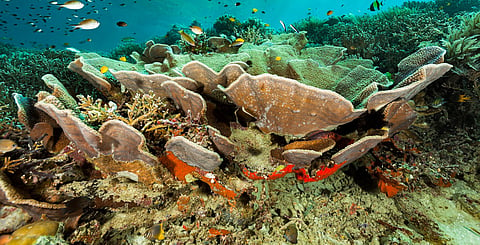

Serious dangers brought by fossil fuel expansion to the Coral Triangle, one of the most biodiverse marine areas in the world, were highlighted by a report released on October 26 at the 16th Conference of Parties (COP16) to the Convention on Biological Diversity (CBD).
The Coral Triangle, often referred to as the ‘Amazon of the seas’, is a huge marine area spanning over 10 million square kilometres. It includes countries like Indonesia, Malaysia, Papua New Guinea, Singapore, the Philippines, Timor-Leste, and the Solomon Islands.
This region is home to 76 per cent of the world’s coral species and supports more than 120 million people who rely on its resources for their livelihoods.
During the conference, notable speakers such as Tyson Miller from Earth Insight, Gerry Arances from CEED Philippines, and John Amos from SkyTruth shared their findings and stressed the urgent need to address the challenges posed by fossil fuels.
The report, titled Coral Triangle at Risk: Fossil Fuel Threats and Impacts, is produced by Earth Insight and SkyTruth. It presents alarming facts about oil and gas activities in the Coral Triangle.
More than 100 offshore oil and gas blocks are currently in operation in the Coral Triangle, covering over 120,000 square kilometres, which is about 1 per cent of the Triangle.
Additionally, there are over 450 blocks being explored for future extraction, covering another 1.6 million square kilometres. If all these activities become fully operational, they could impact 16 per cent of the Coral Triangle.
The report also highlights that significant parts of critical habitats are under threat. There are overlaps with oil and gas blocks, affecting 24 per cent of coral reefs, 22 per cent of seagrass areas, and 37 per cent of mangroves.
Since 2020, 793 oil slicks have been detected in the Coral Triangle, mainly due to ships, with 98 per cent caused by bilge dumping from traveling vessels. The total area affected by these oil slicks is over 24,000 square kilometres, almost enough to cover the land of the Solomon Islands.
One of the most serious events mentioned in the report is the Princess Empress oil spill, which occurred in 2023 near the coast of the Philippines. This spill adversely affected more than 20 marine protected areas (MPA) and impacted 21,000 families, with economic damages reaching about 3.8 billion Philippine pesos (around $68.3 million). The spill disrupted local fishing industries and endangered marine habitats.
The report also looks at the growing liquefied natural gas (LNG) infrastructure in Southeast Asia. Between 2016 and 2022, countries in the region invested over $30 billion in LNG. Currently, there are 19 LNG terminals operating in the Coral Triangle, with more planned for the future.
This development poses more risks to marine ecosystems and increases vessel traffic, raising concerns about potential oil spills and habitat destruction.
Fossil fuel expansion threatens the region’s biodiversity in several ways. Noise pollution from shipping and exploration activities harms marine life, especially species like whales and dolphins that rely on sound for communication, navigation, and finding food.
Loud noises from seismic exploration and commercial shipping can disrupt these essential functions and lead to changes in behaviour and increased mortality rates in some marine species.
The report also reveals that 16 per cent of MPAs overlap with oil and gas blocks. This threatens sensitive ecosystems, as 80 MPAs in the Coral Triangle are completely covered by these activities, raising serious concerns for biodiversity conservation.
Additionally, 15 of the 19 operational LNG terminals are located within 10 kilometres of sensitive habitats like coral, seagrass, or mangrove areas. Wastewater from these ships can contain harmful chemicals and pathogens, contributing to toxic algal blooms and lowering water quality, which further jeopardises marine life.
The impact of oil spills and fossil fuel infrastructure goes beyond environmental damage; it also poses serious threats to local communities. Countries that rely on fossil fuels often end up in long-term debt, as many have seen rising government debt due to borrowing money for resource exploitation.
The recent Princess Empress oil spill forced local schools to close because of toxic fumes, and many fisherfolk struggled to work. Residents living near the affected shorelines experienced nausea and dizziness, showing how vulnerable local populations, who depend on clean marine environments for their survival, are.
In South Bali, proposed LNG projects threaten sacred sites of indigenous communities. Local leaders worry that these developments will harm not just the environment, but also their cultural heritage and community well-being.
To address these threats, the report recommends several urgent actions to protect the Coral Triangle.
First, a moratorium should be put in place to stop oil, gas, mining, and other industrial activities in sensitive areas.
Second, the development of renewable energy plans should be encouraged to reduce reliance on fossil fuels, especially LNG.
Lastly, the Coral Triangle should be classified as a Particularly Sensitive Sea Area (PSSA) to provide it with special protection from harmful maritime activities.
Despite the growing threats, local communities are taking action. In the Philippines, grassroots movements like Protect VIP are opposing fossil fuel projects and demanding accountability, especially in light of the Princess Empress oil spill.